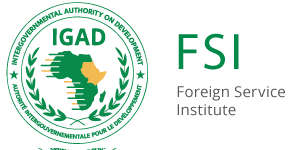June 24, 2022 (ADDIS ABABA, Ethiopia): The Intergovernmental Authority on Development (IGAD) through its IGAD Foreign Service Institute (IGAD FSI), with the support from the European Union through the Austrian Development Agency, concluded a two-day regional conference to facilitate knowledge sharing and collaboration digital diplomacy between Member States’ national Foreign Services Institutes
The two-day Regional Conference provided a platform for participants to discuss and devise strategies to address regional challenges faced by member states including, limited access to reliable and affordable internet, inadequate information and communication technology infrastructure, and varying levels of digital literacy.
At the opening of the IGAD FSI Regional Conference on Digital Diplomacy, the Director of IGAD FSI, Mr. Mohamed Omar Djama, highlighted that Covid-19 crisis had emphasized the importance of digital diplomacy as one of the key soft power tools used in the delivery of modern public diplomacy. “Digitalization has transformed the way in which governments engage with each other”, he said.
During the conference, the facilitator Dr Mutinda Mutisya stated: “Participants explored the concept of the digital diplomacy, its philosophical, epistemological, and methodological foundations.” He added that the conference explored the impact of digitization on diplomacy and generated discussions “on pertinent topics on digital diplomacy such as comparative analysis between global and African digital diplomacy, internet governance and digital diplomacy, opportunities and challenges in digital diplomacy, policies, strategies, and implementation of digital diplomacy at the state level and IGAD region, digital diplomacy and soft power, and methods of evaluating the impacts of digital diplomacy.”
The conference enabled participants to explore innovative approaches to digital diplomacy that can capitalise on the region’s unique opportunities. It also provided a collaborative forum for participants to share knowledge and network.
The Conference on Digital Diplomacy came to an end where participants shared knowledge and evaluated the Impact of Digital Diplomacy in the region. Discussions focused on the metrics for assessing the effectiveness of digital diplomacy, measuring the impact of digital diplomacy initiatives, best practices in evaluating digital diplomacy efforts.
At the conclusion of the conference, recommendations included:
- Capacity building for diplomats in the use digital diplomacy within the IGAD region;
- IGAD member states to develop technology connectivity infrastructure to enable enhanced digital diplomacy; and
- Development of an IGAD Regional Digital Diplomacy policy.




